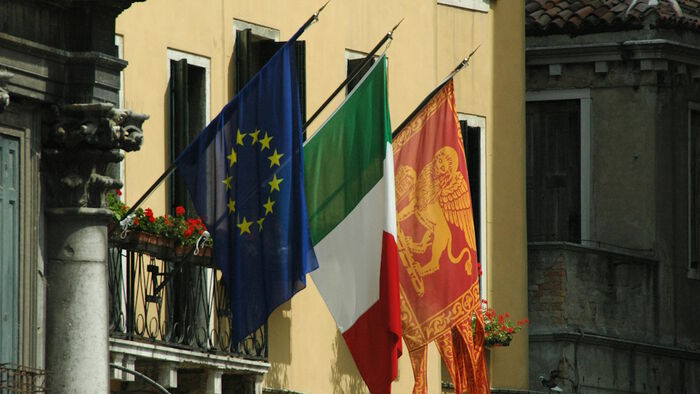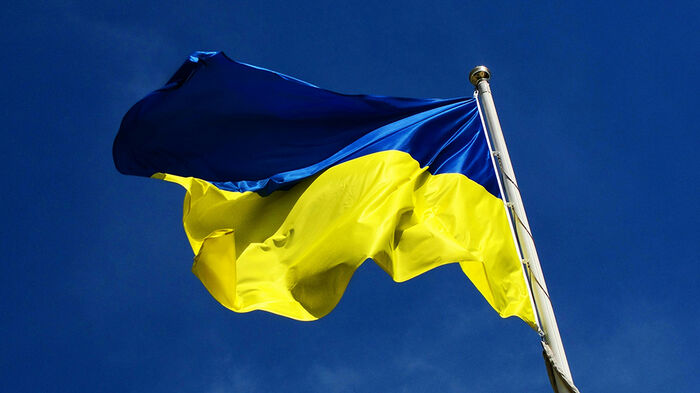‘Does the war in Ukraine split the right-wing camp?’ asked Martin Sellner, shooting star of the German-speaking branch of the far-right Identitarian Movement, on a social media platform popular among far-rightists on 1 March 2022. His genuine concern may surprise observers of the European far-right scene: parties and movements have long been known to be Putin apologists. Typically, they have not condemned Russia’s annexation of Crimea and hybrid war in eastern Ukraine since 2014. In turn, many of them receive financial support from the Kremlin.
Nevertheless, full-scale war presented an ideological dilemma for the European far right, and the German far right in particular. Again, Martin Sellner underscored this dilemma (this time in the German-language far-right magazine Secession): ‘Ukraine vs. Russia–whom does the ethno-pluralist support?’ In the face of full-scale war, different ideological elements of German far-right thought clashed with each other. Germany’s idiosyncratic combination of anti-elitist populism, ethno-pluralism, an ostentatious form of pro-Israel philosemitism, and the doctrine of non-violence, made it nearly impossible for the far right to offer coherent support for Russia, or to condemn Ukraine.
Different Reactions to the War
German-language far-right discourses were marked by ambivalence and indecisiveness in late February and March 2022. Several actors, including Germany’s largest far-right party Alternative for Germany (AfD), initially avoided taking a determined stance, fashioning themselves as geopolitically competent and politically neutral analysts.
Martin Sellner, for instance, emphasized in a video message on 25 February 2022, that due to his lack of personal connections to either Ukraine or Russia, he was a neutral ‘sympathizer of Putin and Russia … a sympathizer of Ukraine … and a sympathizer of America’. In a blog post on the Secession website published a few days later, Germany’s chief far-right intellectual Götz Kubitschek similarly argued that the German far right should remain neutral. He called upon his associates not to take a pro-Ukrainian position simply for the ‘hope’ of ‘shifting to the moral majority after years of pariah existence’.
In an equally ambivalent manner, in parliament AfD MP Matthias Moosdorf condemned the invasion as a ‘terrible tragedy’, and even invoked the concept of the ‘break of civilization’, a term which in German debates is normally reserved for the Holocaust. At the same time, he criticized Ukrainian language policies in the eastern part of the country, which he claimed breached the local population’s human rights.
However, in stark contrast to Moosdorf and others, dozens of violence-prone far-rightists on social media declared their willingness to fight on the Ukrainian side, and to provide material support for Ukrainian nationalist fighters.
Important Imaginaries
Arguably, the key to explaining different positions on the war in the Germanophone far right is to examine how these actors think about Russia and Ukraine, respectively. There are at least two partially opposed imaginaries about the two countries, and they mutually shape different geopolitical positions on the war.
In a recently published book chapter I carried out a qualitative analysis of primary material such as websites by German far-right parties like AfD, Heimat/NPD, and III. Weg (Third Way),to shed light on far-right imaginaries about Russia and Ukraine across the German-speaking far right, I also looked at social media by movements such as PEGIDA and the Identitarians. Not least, I read publications by knowledge producers such as the Institute for State Policy and Compact magazine.
Imaginary no. 1: Russia as a Victim of US Imperialism
The dominant political imaginary about Russia and Ukraine in the German far right constructs a largely positive image of Russia, and a negative image of Ukraine. It frames Russia as a victim of western and specifically US military imperialism. In turn, it vilifies Ukraine as a puppet of western regimes. Russia and Ukraine are framed as ‘brother nations’ that are engaged in a ‘fratricidal war’, after the smaller brother, Ukraine, erroneously left the ‘right’ path due to western seduction and corruption. This pro-Putin imaginary is put forward by most German far-right actors, excluding the small neo-Nazi party III. Weg.
The ideological contradiction between ethno-pluralist support for national self-determination and the rejection of Ukrainian sovereignty was discussed most directly by Martin Sellner in Secession on 14 November 2022. He argued:
Using the example of the war in Ukraine, we see the blind spot of a geopolitically naive ethno-pluralism. There is no enforceable ‘people’s right to self-determination’ […] Ultimately, self-determination and sovereignty must be guaranteed militarily. If you are not able to do this yourself, you need a third-party ‘guarantor’. A small people therefore usually needs a protective force. The ideal world of a naive ethno-pluralism would be a ‘zoo of nations’ in which all ethnic groups hermetically separated from each other in their own enclosure and ‘sovereignly’ co-exist. […] In fact, this ‘zoo of nations’ would also need a zookeeper to maintain order and keep the actors within their boundaries. Paradoxically, this vision of a ‘world of sovereign nation states’ presupposes a world sovereign as an ‘ethno-pluralistic arbiter’!
As long as the USA is the only power able and willing to provide a world police, it too will decide where a ‘right of self-determination’ is to be carried out militarily. That means: for Ukrainians and Taiwanese, but not for ethnic groups in Yemen, for Kurds, Basques, Armenians or Corsicans, etc. […]
Having pointed to the role of the US in Russia’s war on Ukraine, Sellner concludes:
The war in Ukraine subjects such abstract and unworldly ideas, which may sound nice and seem ‘moral’, to a brutal stress test. Ethno-pluralism can only survive as a right-wing concept if it ‘upgrades’ geopolitically and abandons romantic and moral maximum positions. In short, this means opening up to the concept of the greater area and the idea of empire.
Imaginary no. 2: The Ukrainian Defenders of Fortress Europe against an Asian Invasion
A second, comparatively fringe political imaginary constructs a negative image of Russia, and a positive one of Ukraine. Specifically, it vilifies Russia as a non-European, racially inferior Asian empire. In turn, it exalts Ukraine as a defender of the racially superior, white Fortress Europe. Crucially, this construction does not glorify the contemporary Ukrainian state and government, but refers to anti-establishment Ukrainian nationalists and paramilitary forces. This pro-Ukrainian, anti-Putin imaginary is put forward by the small-scale neo-Nazi party III. Weg, and individual activists such as Tobias Schulz (alias Baldur Landogart), a former executive of Heimat/NPD who split with his party over the war.
This fringe imaginary rejects the dominant narrative of the ‘fratricidal war’. Denying Russia Europeanness, III. Weg asked in a blog post from 17 March 2022: ‘Where can one still speak of a “fratricidal war”, when Moscow once again unleashes an onslaught of barbarians from Asia onto white Europe?’, and concluded that ‘[t]here is no fratricidal war taking place in Ukraine, but rather the fight for survival of a free and proud European people against the renewed stranglehold of an Asian tyranny!’.
Not least, this fringe imaginary about Russia and Ukraine included a far-right construction of Europe, namely the ‘hope’ for a nationalist awakening in Germany in the context of the war. For example, in the ‘National Revolutionary Declaration on the Ukraine-War’ from 25 February 2022, III. Weg mused:
Regardless of all the tragedy for Ukraine as a nation and the human tragedies that every armed conflict brings, we still see in such images that Europe is not yet completely spiritually dead and that people are still fighting for their ideals. In the darkness of war, it is possible to see in such images the hope that our struggle will one day find a victorious end.
But: Racists Remain Racists
Independent of the framing of Russia and Ukraine across the German far right, my analysis reveals important similarities between either imaginary.
First, both imaginaries are deeply racist and/or white supremacist. Unlike in the so-called European migration crisis of 2015/16, all actors welcomed war refugees from Ukraine in Germany and Europe, framing them as ‘real refugees’. Yet, they spread conspiracy narratives that the war essentially served non-whites as an opportunity to enter Germany. According to this story, the entire process was orchestrated by political elites and ultimately aimed at the ‘Great Replacement’ of European societies.
Second, both imaginaries include the projection of a future Europe as a fortress independent from both Russia and the US. The pro-Russian editor of Compact magazine, Jürgen Elsässer, repeatedly expressed his hope for the war to incite a new geopolitical era of a bloc-free world and new security landscape in Europe. Similarly, as early as 25 February 2022, the pro-Ukrainian III. Weg proclaimed that ‘Our answer to the question of Washington or Moscow, West or East, can only be: Europe!’, and painted the positive future vision of ‘the freedom of the European peoples from all foreign empires, the defence of their own identity and the vision of a united Europe’.
Thus, Russia’s war in Ukraine has (so far) not split the right-wing camp, as Martin Sellner dreaded in early 2022. Instead, the tensions between different geopolitical positions appear to have been superseded by the scene’s shared Eurocentric racism.
.jpg)




